#ljsbugblog
Explore tagged Tumblr posts
Text

a weird horse appreciates the sunset from atop one of our cacti.

Giant Green Slantface, male(?) (Acrida conica), March '24.
#ljsbugblog#bugblr#entomology#macro#insects#orthoptera#acrididae#grasshoppers#short-horned grasshoppers#acrida#slantface grasshoppers#acrida conica#giant green slantface
3K notes
·
View notes
Text
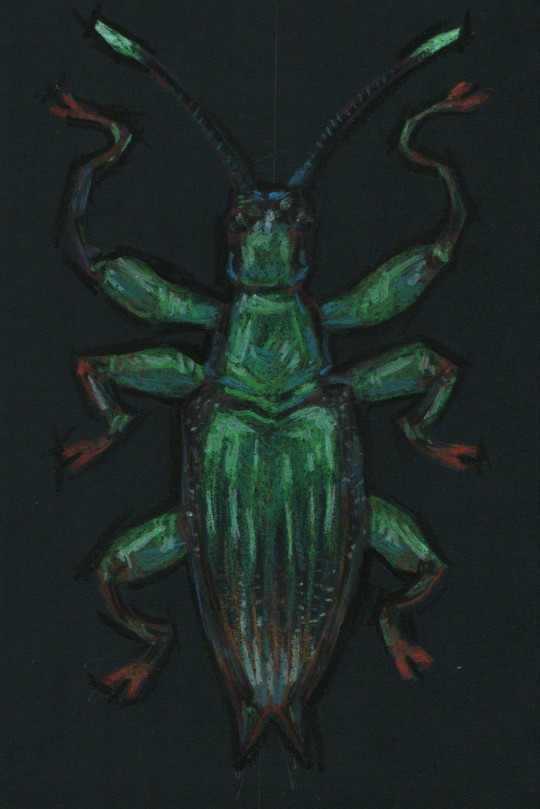
folks are really liking my bug doodles on black paper, so I figured I should make some nicer pieces too :) this is a wip of an Aproida balyi, one of my favourite beetles! I also have a post about these guys on my bug blog @ljsbugblog 🪲
#art#traditional art#drawing#original art#oil pastel#illustration#animal art#wip#bugs#bugblr#bug art#beetles#oil pastel painting#oil pastel drawing#insects#my art
208 notes
·
View notes
Text


probably one of the nicest looking moths I've found yet, Joseph's Coat Moth! I'm back from a trip to the northern tropics, and the wildlife did not disappoint.
Joseph's Coat Moth (Agarista agricola).
#sorry for my absence!#i have some incredible creatures to share to make up for it though#ljsbugblog#bugblr#entomology#insects#lepidoptera#moths#noctuoidea#owlet moths#agaristinae#forester moths#agarista#agarista agricola#Joseph's coat moth
5K notes
·
View notes
Text
this Mud-dauber Wasp chose our windowsil to build her nest! after a bit of investigation of me and my camera, she graciously allowed me to photograph her while she worked on her construction.
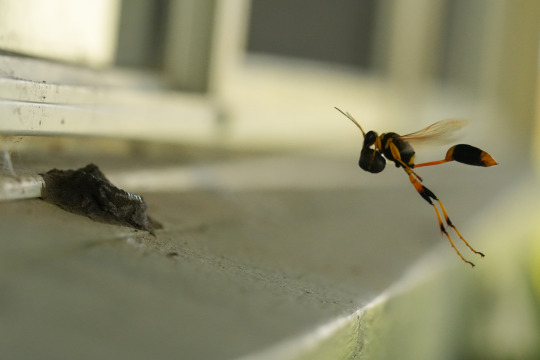

in the photos above, she has arrived with a ball of mud collected from somewhere nearby. this nest isn't for her to live in, but for her young to grow and pupate. in this mass of mud she will craft several individual cells, and provision them all with the paralysed bodies of orb-weaver spiders. each cell will have a single egg laid on the first spider, before being sealed off with more mud.
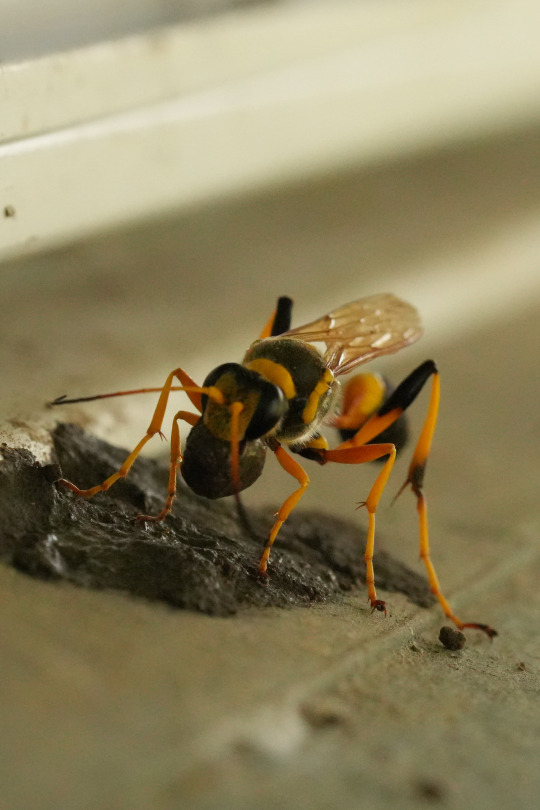
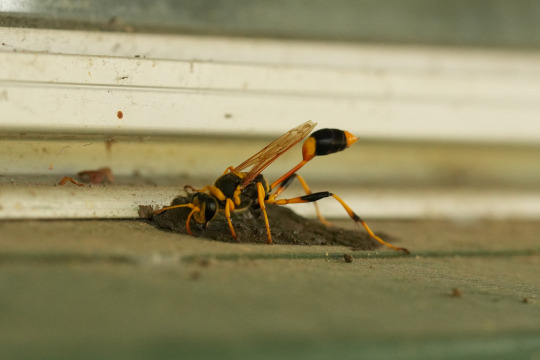
here, she picks the next spot to deposit her ball of mud, using her mandibles to smooth it onto the structure. when the larvae hatch, they will consume all the spiders in their respective cells, before pupating and then emerging as adults wasps.

each time she finished with a layer of mud, she would take a moment to groom her forelegs and antennae, before flying off to repeat the process. these photos were taken earlier in the Summer, and as of posting this, the adult wasps have yet to emerge.
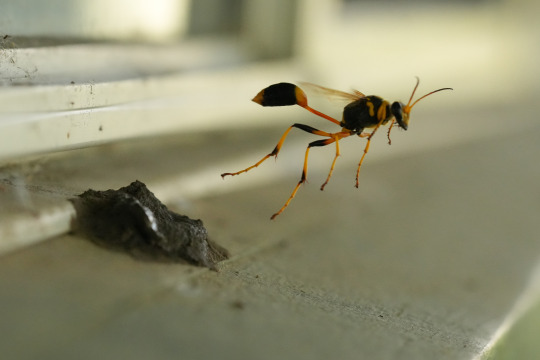
Covered-cell Mud-dauber Wasp, female (Sceliphron laetum).
#ljsbugblog#bugblr#entomology#macro#insects#hymenoptera#aculeata#wasps#sphecidae#thread-waisted wasps#sceliphron#slender mud-dauber wasps#sceliphron laetum#covered-cell mud-dauber wasp
2K notes
·
View notes
Text
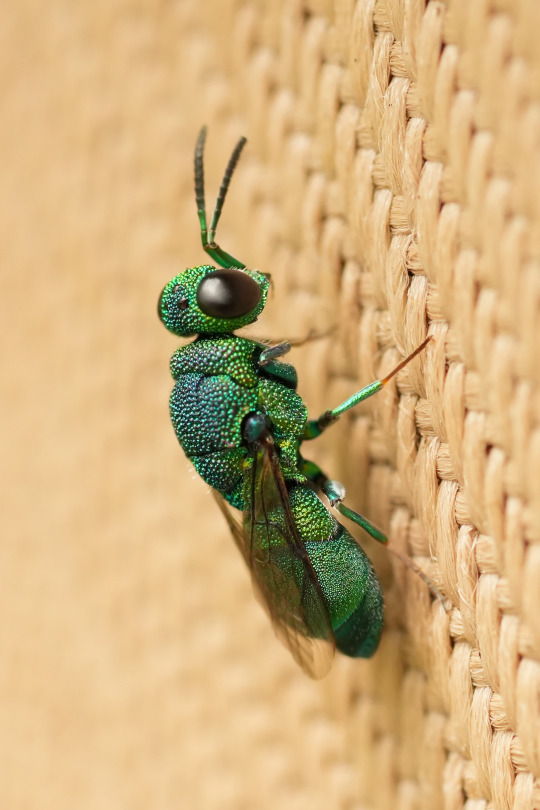
a tiny Cuckoo Wasp, pausing her forage for a quick rest.
I very rarely witness cuckoo wasps at rest, and its even rarer that they allow me to get close, so I am especially pleased with this photo.
Unknown Cuckoo Wasp (family Chrysididae).
#ljsbugblog#bugblr#entomology#macro#insects#hymenoptera#aculeata#wasps#chrysididae#cuckoo wasps#unconfirmed ID
1K notes
·
View notes
Text
just for fun, a compilation of every wasp species I've seen drink from the pond so far.
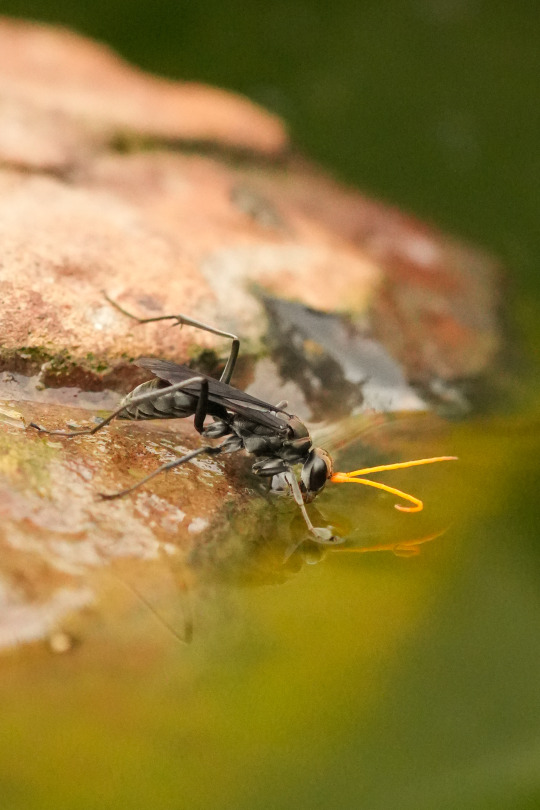
Spider Wasp, genus Fabriogenia.

Potter Wasp, subfamily Eumeninae.

Potter Wasp, genus Paralastor.

Square-headed Wasp, subfamily Crabroninae.

Vase-cell Mud-dauber Wasp, Sceliphron formosum.

Square-headed Wasp, genus Pison.

Australian Paper Wasp, Polistes humilis.
#ljsbugblog#bugblr#entomology#macro#insects#hymenoptera#aculeata#wasps#pompilidae#spider wasps#fabriogenia#vespidae#potter wasps#eumeninae#paralastor#crabronidae#crabroninae#square-headed wasps#pison#sphecidae#thread-waisted wasps#sceliphron#slender mud-dauber wasps#sceliphron formosum#vase-cell mud-dauber wasp#polistes#paper wasps#polistes humilis#australian paper wasp
1K notes
·
View notes
Text

my favourite visitor to the pond is this beautiful Potter wasp (subfamily Eumeninae). she regularly comes to the pond to drink, and luckily isnt too camera-shy!
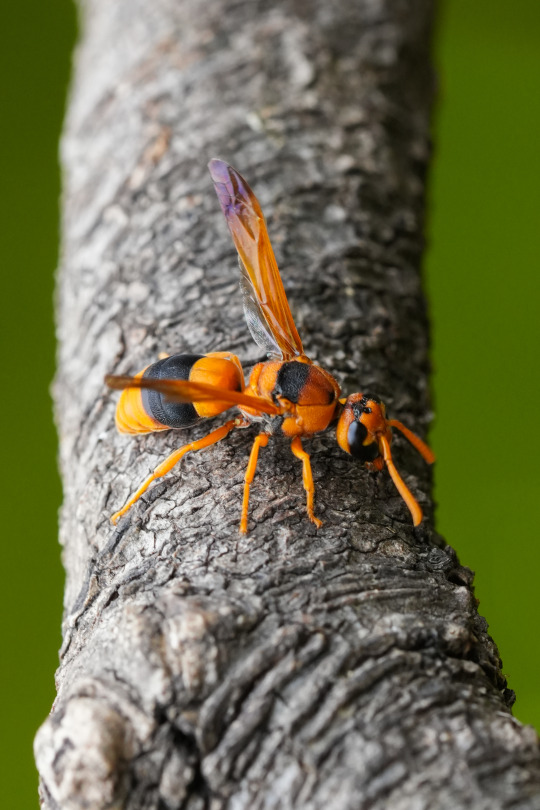
being a potter wasp, she is a solitary creature who spends her time building mud-nests to house her larvae, and hunting caterpillars with which to feed them. as an adult, she is a pollinator who feeds on flower nectar.
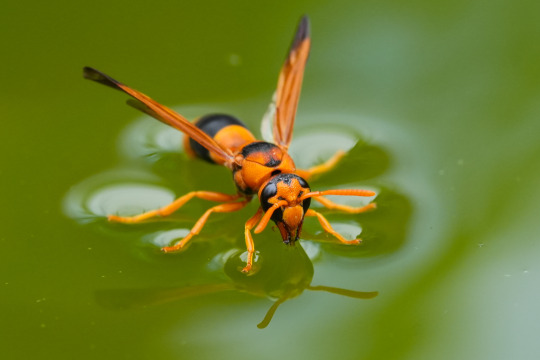
she is about 30mm (1.2in) in length, but deft enough to carefully land on top of the water without breaking the surface tension (so far she is the biggest insect I've seen thats able to do this). its an amazing behaviour from both an entomologic and photographic perspective, these photos are some of my favourites <3
Unknown Potter Wasp, female (subfamily Eumeninae).
#ljsbugblog#bugblr#entomology#macro#unconfirmed id#insects#hymenoptera#vespidae#wasps#eumeninae#potter wasps#mason wasps
3K notes
·
View notes
Text

small !!!
unknown weevil (family Curculionidae).
1K notes
·
View notes
Text
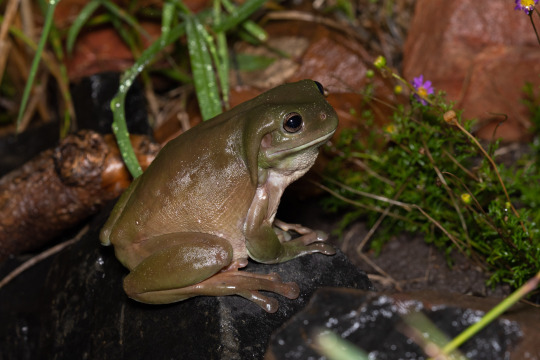
the largest Green Tree Frog I've ever seen, contemplating the daisies by the pond on a warm rainy night.

Green Tree Frog (Ranoidea/Litoria caerulea).
#ljsbugblog#bugblr#macro#not a bug#amphibia#amphibians#anura#frogs#herpetology#hylidae#tree frogs#ranoidea#ranoidea caerulea#litoria#litoria caerulea#green tree frog#australian green tree frog
831 notes
·
View notes
Text
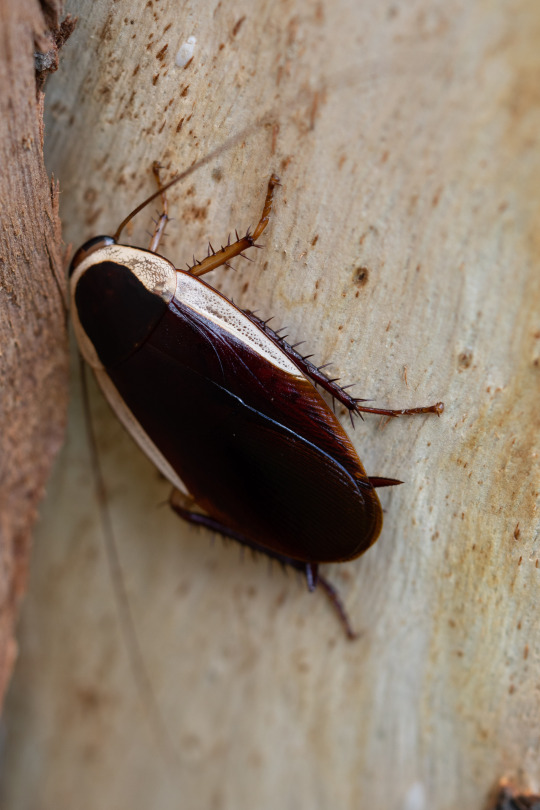
exquisite creature chilling under some gumtree bark.

Unknown Cockroach (genus Methana).
#ljsbugblog#bugblr#entomology#macro#insects#blattodea#cockroaches#blattidae#household cockroaches#methana#unconfirmed id
945 notes
·
View notes
Text
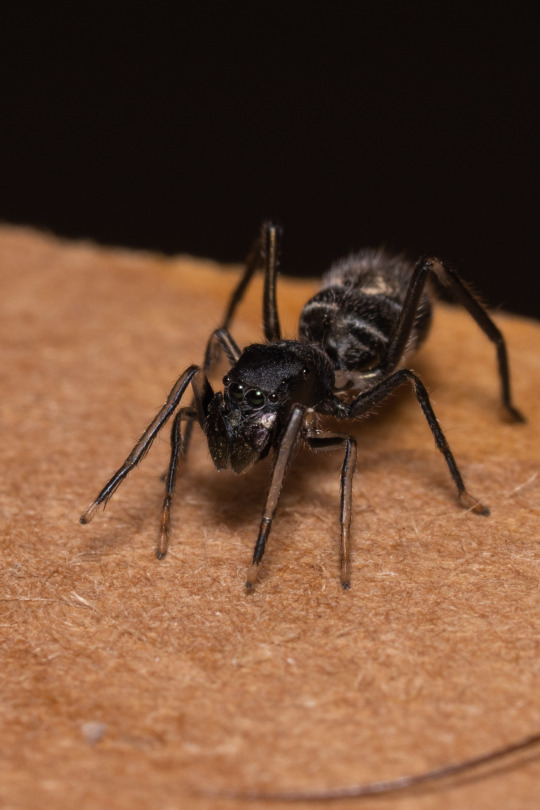
we finally found another Myrmarachne ant mimic, in our bathroom of all places.
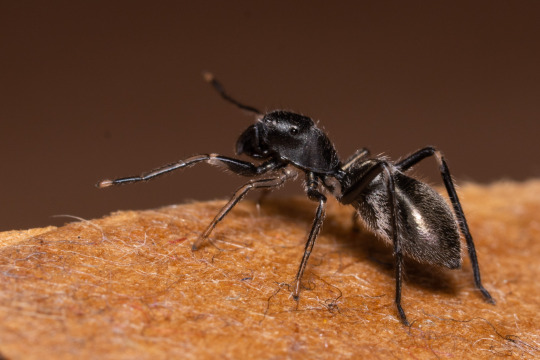
I've been itching to get some more photos of these spiders since getting my speedlite, but they're very elusive and almost constantly in motion. thankfully this lady was content to explore a sheet of cardboard while I took a million photos of her like a madman.
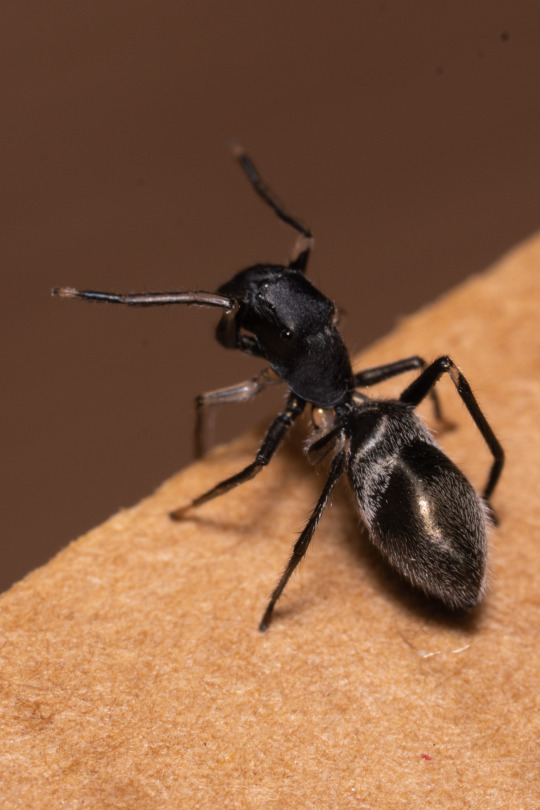
special shoutout to my wonderful partner for a) spotting the spider in our house and b) wiggling their fingers in front of her to keep her attention while I got these photos (it seems jumping spiders are the wayward cats of the arthropod world lol).

I'll link my other Myrmarachne post here, as its interesting to compare the colouration of the two individuals. likely the same species, but my previous sighting had a much brighter gold on her abdomen.
Red-headed Ant-mimic Spider, female (Myrmarachne erythrocephala).
#ljsbugblog#bugblr#entomology#macro#arachnids#spiders#salticidae#jumping spiders#myrmarachne#ant-mimic spiders#myrmarachne erythrocephala#red-headed ant-mimic spider
634 notes
·
View notes
Text
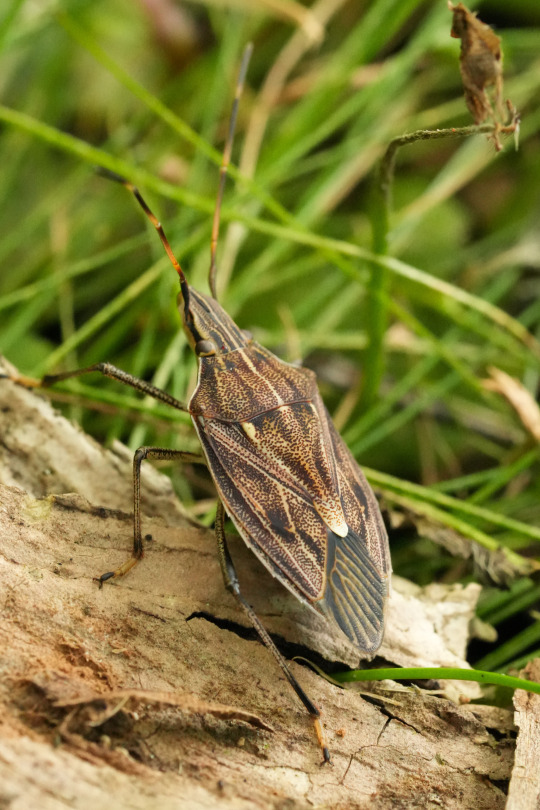
'brown' insects are criminally overlooked, but are some of the most aesthetically pleasing creatures out there.
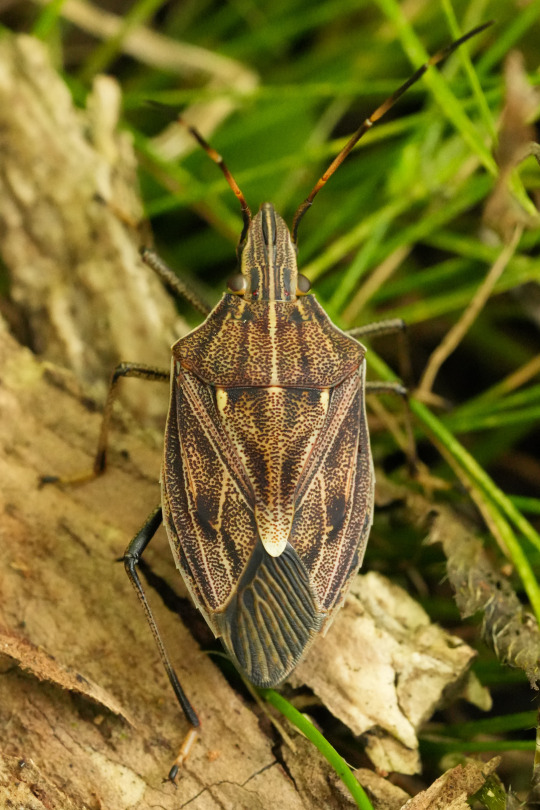
No common name (Poecilometis histricus).
#ljsbugblog#bugblr#entomology#macro#insects#hemiptera#heteroptera#true bugs#pentatomidae#stink bugs#poecilometis#poecilometis histricus
1K notes
·
View notes
Text
I want my first bug here to be one of my favourites, Aproida balyi, also known as a very polite lady, as seen here:
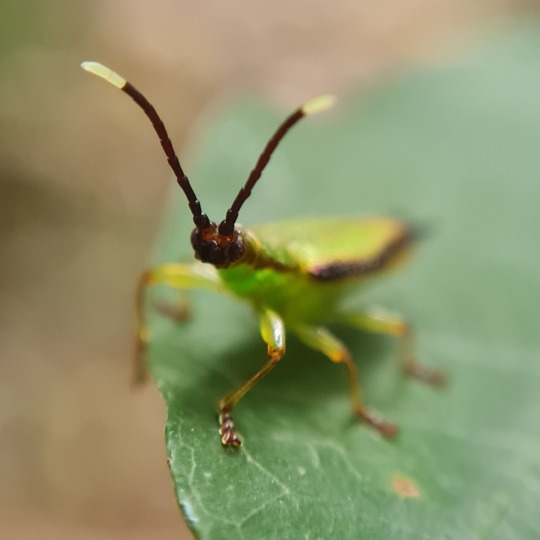
there is currently no common name for these guys, and from what I understand they are the only species of the tribe Aproidini/genus Aproida (they fall into the family Chrysomelidae, aka leaf beetles). they are only found in subtropical Eastern Australia. their carapace is the most vibrant green, with a lot of dents and texture!
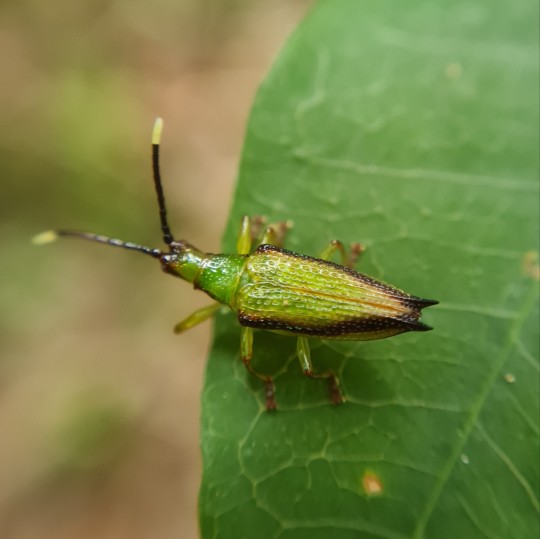
to finish off, here is a slow-motion video I captured of this female taking flight!
please let me know if you like posts like this! I'm very new to bugblr, but im so excited to have a blog to share my love of entomology with the world :)
#ljsbugblog#bugblr#entomology#insects#beetles#leaf beetles#aproida bayli#chrysomelidae#cassidinae#macro#video
1K notes
·
View notes
Text
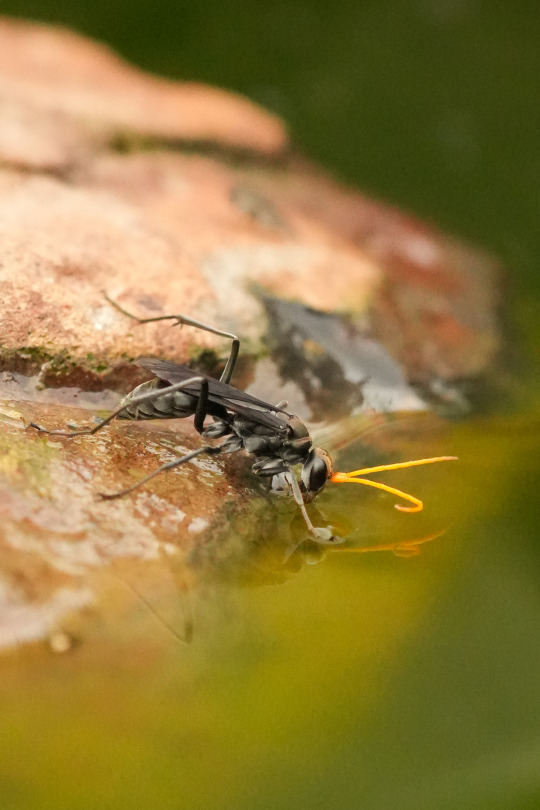
another elusive pond visitor that I was finally able to photograph. this beautiful spider wasp has been visiting the pond since we first put water in it. I think she's finally becoming accustomed to a big lens looming over her while she drinks lol.
Unknown Mud-nesting Spider Wasp (genus Fabriogenia).
#ljsbugblog#bugblr#entomology#macro#insects#hymenoptera#aculeata#wasps#pompilidae#spider wasps#fabriogenia#unconfirmed ID
561 notes
·
View notes
Text
a new Peocilometis species for me, the handsome P. calidus!
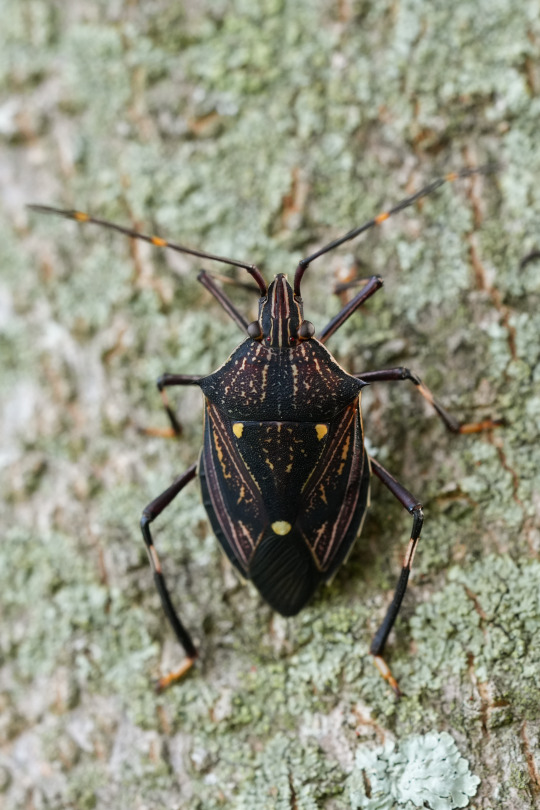
my first assumption when seeing this guy was that they were P. apicalis, but thankfully there are much more knowledgable folks on iNaturalist who can ID stink bugs for me :')
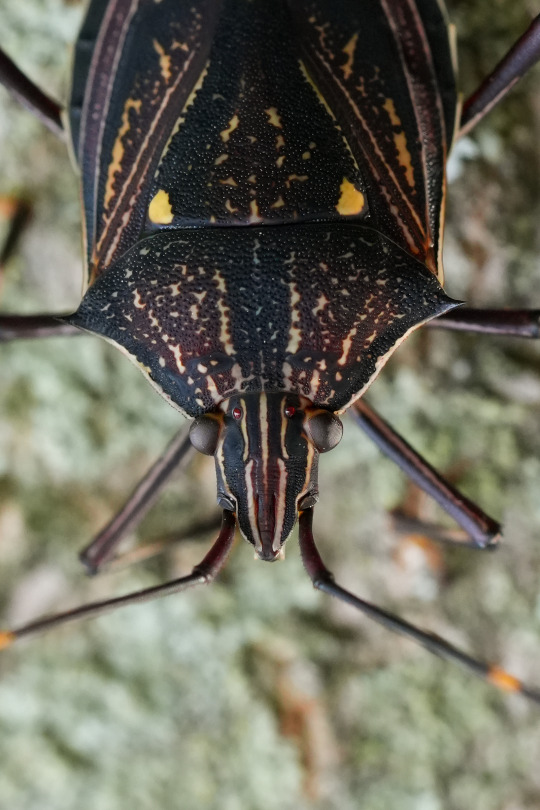
No common name (Poecilometis calidus).
#ljsbugblog#bugblr#entomology#macro#insects#hemiptera#heteroptera#true bugs#pentatomidae#stink bugs#poecilometis#poecilometis calidus
544 notes
·
View notes
Text

Green-blotched Moth (Cosmodes elegans). My first time seeing one of these guys, found on a pair of socks lol.
Taken without my macro lens, so apologies for the quality :s
1K notes
·
View notes